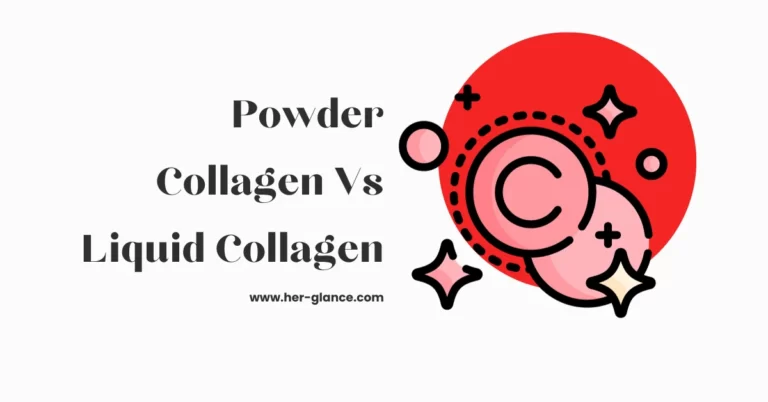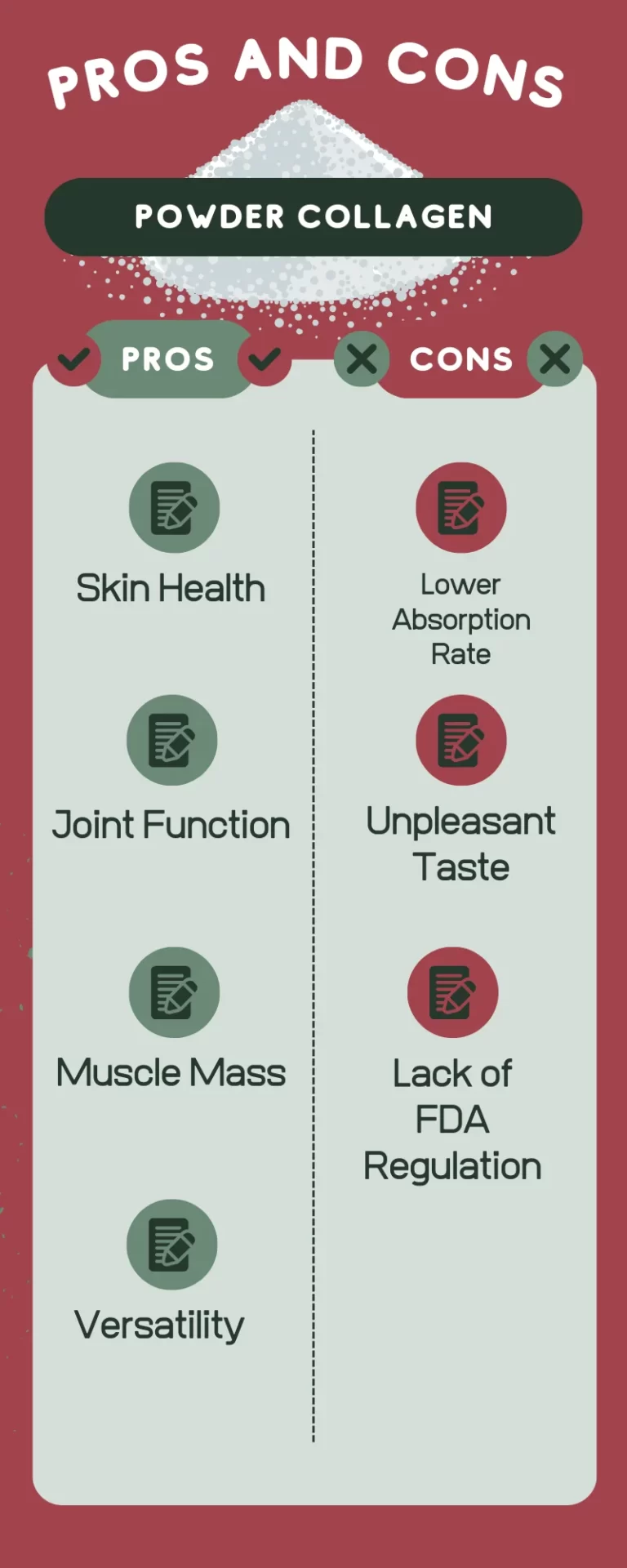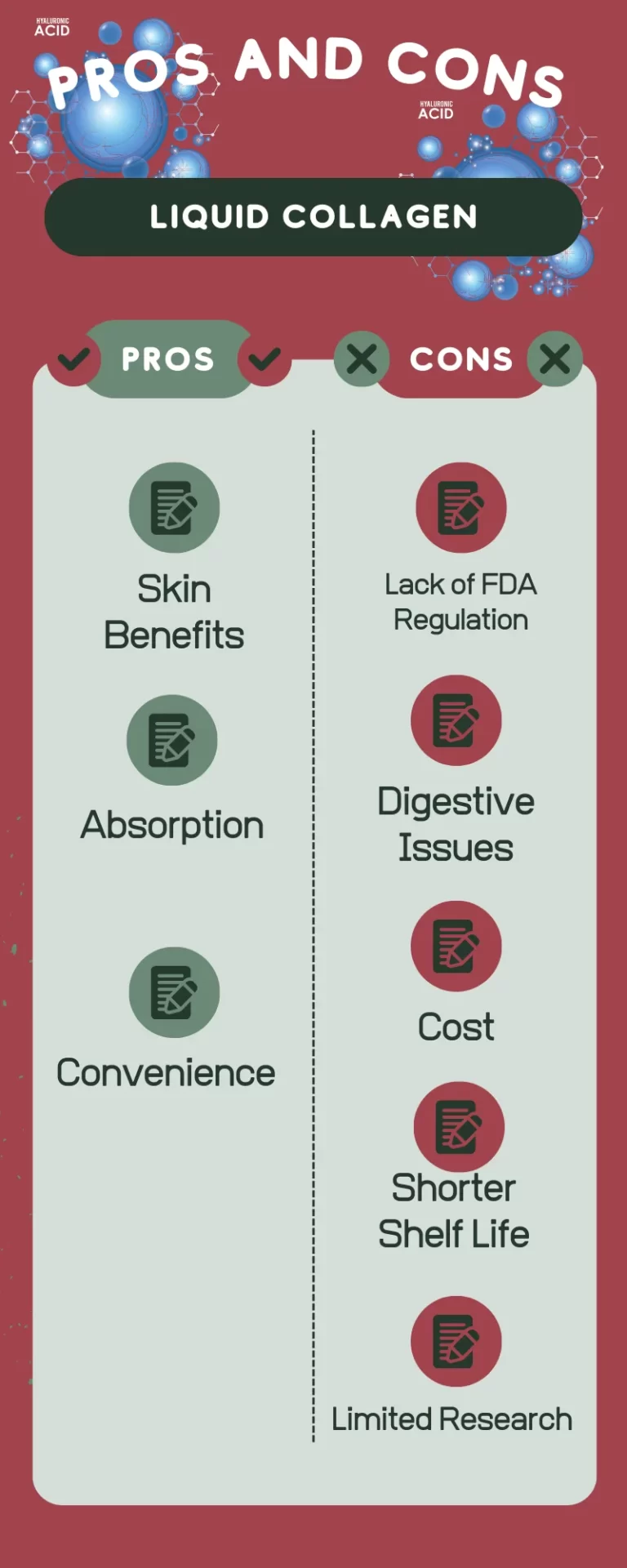Powder Collagen Vs Liquid Collagen
In the realm of health supplements, collagen, a vital protein for skin elasticity and joint health, has gained significant attention. Various forms of collagen exist, including powder and liquid. This article offers a comprehensive comparison of powder collagen versus liquid collagen. It delves into their unique attributes, cost-effectiveness, ease of use, and expert opinions. The information aims to guide consumers in making informed decisions about which form of collagen supplement best suits their needs.

- Understanding Collagen and Its Importance
- The Basics: Powder Collagen
- Pros and Cons of Powder Collagen
- The Basics: Liquid Collagen
- Pros and Cons of Liquid Collagen
- Comparative Analysis: Absorption and Effectiveness
- Considering the Ease of Use: Powder Vs Liquid
- Cost Comparison: Powder Collagen Vs Liquid Collagen
- Expert Opinions on Collagen Supplements
- Making the Choice: Powder Collagen or Liquid Collagen?
- Conclusion
Understanding Collagen and Its Importance
Undeniably, comprehending the role and significance of collagen in the human body is paramount to understanding its impact on overall health and wellness. Collagen, a structural protein, forms the building block of our skin, hair, nails, bones, tendons, and ligaments. It is the most abundant protein in our bodies, accounting for nearly 30% of the total protein content. The distinctive helical structure of collagen provides tensile strength, making it a crucial component within our connective tissues.
Scientific studies have highlighted the indispensable role of collagen in maintaining skin elasticity and hydration. It also promotes the health of our joints, bones, and tendons by providing mechanical resistance to stretching and contributing to their strength and flexibility. Moreover, collagen has a significant role in the repair of bodily tissues and in wound healing, showcasing its importance in the body’s overall regeneration process.
Despite its abundance, the natural production of collagen starts to decline with age, excessive sun exposure, and consumption of sugar and refined carbs. This results in signs of aging like wrinkles, saggy skin, and joint pain. To counteract this, the supplementation of collagen has gained popularity. Supplementing with collagen can help delay the aging process, improve skin health, and boost joint and bone health.
The Basics: Powder Collagen
Although powder collagen is a popular form of this essential protein supplement, it is crucial to understand its basic properties, preparation methods, and benefits to make an informed choice.
Powder collagen, derived mainly from bovine or marine sources, is a hydrolyzed form of collagen, meaning it is broken down into smaller molecules for easy absorption by the body. Its primary purpose is to promote skin elasticity, improve joint health, and support bone density. However, the efficiency and impact of collagen supplementation are still under research, with some studies suggesting potential benefits.
The preparation of powder collagen is simple and versatile. It can be mixed with water, beverages like coffee or smoothies, or incorporated into food recipes. The recommended dosage is generally about 10-20 grams per day, but it may vary depending on the individual needs and the product’s specific instructions.
The benefits of powder collagen are manifold. Research suggests that regular consumption of collagen powder may help slow the aging process by reducing wrinkles and dryness. It may also help increase muscle mass, promote heart health, prevent bone loss, and relieve joint pain.
Nevertheless, it is essential to consult with a healthcare professional before starting any new supplement regimen. They can provide guidance on the appropriate dosage and potential interactions with other medications or conditions. Furthermore, while powder collagen is generally safe for most people, it may cause side effects in some, such as heartburn, feelings of fullness, and a lingering bad taste.
Pros and Cons of Powder Collagen

Powder collagen’s potential benefits are impressive, but it’s equally important to consider its drawbacks before incorporating it into your daily regimen. Powder collagen supplements are revered for their ability to support skin health, improve joint function, and boost muscle mass. They are also praised for their versatility, as they can be conveniently added to a variety of foods and drinks.
Research supports these benefits. A study in the Journal of Medical Nutrition and Nutraceuticals found that collagen supplementation improved skin elasticity in a group of women aged 35-55. Similarly, a 2018 review in the British Journal of Sports Medicine reported that collagen supplements significantly improved joint pain in athletes.
Despite these potential benefits, powder collagen also has several drawbacks. Firstly, the absorption rate of collagen in powder form may be lower than that of liquid collagen, potentially reducing its effectiveness. Secondly, some users report a distinct, unpleasant taste, making it harder to incorporate into meals. Lastly, as with all supplements, powder collagen is not regulated by the FDA, raising concerns about product quality and safety.
The Basics: Liquid Collagen
While the debate on the effectiveness of powder collagen continues, it is essential to delve into the basics of liquid collagen, its potential benefits, and drawbacks. Liquid collagen, also known as collagen peptide or hydrolyzed collagen, is a protein derived from animal sources that is pre-digested into smaller peptides for better absorption.
Evidence suggests that liquid collagen has a higher bioavailability compared to its powder counterpart. This means that a larger proportion of the supplement is absorbed into the body, thereby potentially offering greater benefits for skin health, joint flexibility, and bone strength.
However, it is worth mentioning the drawbacks. The first is the taste, which some people can find off-putting. To overcome this, manufacturers often add sweeteners or flavorings, which can increase the calorie content. In addition, liquid collagen is usually more expensive than powder collagen, which may be a consideration for those on a budget.
Moreover, while there is promising research suggesting benefits of liquid collagen, it is important to note that many studies are industry-funded, which may introduce bias. In addition, the long-term effects of regular collagen supplementation are not yet fully understood. Hence, as with all dietary supplements, it is advisable to consult with a healthcare professional before starting a liquid collagen regimen.
Pros and Cons of Liquid Collagen

In our current discussion topic, we will weigh the pros and cons of liquid collagen, considering its benefits, potential drawbacks, and the existing body of research. Liquid collagen, a protein supplement that plays an essential role in maintaining skin elasticity, joint health, and bone strength, has recently gained increased attention in the health and wellness industry.
The benefits of liquid collagen are plentiful. Research has shown that it can improve skin hydration, elasticity, and reduce signs of skin aging. Moreover, it’s often easier for the body to absorb liquid supplements, potentially making liquid collagen more effective than its powdered counterpart. Additionally, it’s convenient to use as it can be mixed into beverages without altering their texture.
However, the potential drawbacks of liquid collagen must also be considered. The supplement is not regulated by the Food and Drug Administration, leading to concerns about product quality and efficacy. Furthermore, some users have reported digestive issues after consumption. It is also more expensive than powder collagen and has a shorter shelf life.
The existing body of research on liquid collagen, while promising, is not yet definitive. Many studies have been small or industry-funded, which can introduce bias. More extensive, independent research is needed to conclusively establish the efficacy and safety of liquid collagen.
Comparative Analysis: Absorption and Effectiveness
Our comparative analysis aims to assess the absorption rate and effectiveness of liquid collagen versus powder collagen, focusing on how each form affects skin health and joint functionality, and whether the higher cost of the liquid form justifies its potential benefits.
Research suggests that liquid collagen demonstrates a quicker absorption rate due to its hydrolyzed form, which allows it to pass directly into the bloodstream. This can potentially lead to more immediate effects on skin hydration and elasticity, as well as improved joint mobility. However, the evidence remains mixed, with some studies indicating only marginal differences in absorption rates between the two forms.
In terms of effectiveness, a 2019 study indicated both forms of collagen effectively improved skin health and joint functionality. However, the liquid form was marginally superior in terms of bioavailability and speed of results. This suggests that while both forms are beneficial, liquid collagen may offer quicker, more noticeable results.
The cost factor, however, cannot be ignored. Liquid collagen typically costs more than its powder counterpart, and this price difference is a significant consideration for many consumers. Whether the slightly faster absorption and results justify this higher cost is a subjective decision that depends on individual preferences and budget constraints.
Considering the Ease of Use: Powder Vs Liquid
Undeniably, the ease of use between powder and liquid collagen forms is another significant factor to consider in this comparison. The choice between these two forms largely depends on individual preferences and lifestyle. For instance, consumers who value convenience might prefer liquid collagen due to its ready-to-drink nature. It eliminates the need for mixing, thereby saving time and effort.
However, powder collagen offers more versatility. It can be mixed with a variety of beverages and foods, allowing users to incorporate it into their diet more seamlessly. From a portability perspective, powder collagen is lighter and more compact, which may appeal to those who frequently travel.
Recent research also suggests that the flavor and texture of collagen products can influence user experience and adherence to supplementation. Liquid collagen often comes in flavored varieties, which some users may find more palatable. On the other hand, unflavored powder collagen can be easily added to meals and drinks without altering their taste, making it a more neutral option.
In terms of dosage accuracy, powder collagen may have an edge. The ability to measure the exact amount needed can be advantageous for those monitoring their collagen intake closely. Conversely, liquid collagen servings are typically pre-measured, offering less flexibility in adjusting the dose.
Cost Comparison: Powder Collagen Vs Liquid Collagen
When weighing up the cost-effectiveness of powder collagen and liquid collagen, it’s crucial to factor in not only the upfront cost but also the cost per serving, as both forms exhibit varying price points and serving sizes.
A 2023 market analysis shows that the average price for a month’s supply of powder collagen varies between $25 and $45, while liquid collagen can range from $30 to over $70. However, the cost per serving for powder collagen is generally lower, as it often contains more servings per container.
Studies suggest that both forms of collagen have similar bioavailability, meaning the body can absorb and use them at comparable rates. Therefore, from a financial perspective, powder collagen appears more cost-effective. However, liquid collagen often incorporates additional beneficial ingredients such as vitamins and hyaluronic acid, which could justify the higher price for some consumers.
Nonetheless, it’s important to note that cost should not be the sole determining factor when choosing between powder and liquid collagen. The effectiveness, convenience, and individual preference are significant considerations and differ from person to person.
Furthermore, the quality of collagen, regardless of its form, is paramount. Purchasing from reputable brands that ensure high-quality sourcing and production processes is essential.
Expert Opinions on Collagen Supplements
While there is a broad consensus among nutritionists that collagen supplements can benefit skin health, some experts caution that more research is needed to substantiate claims about their effects on joint and bone health. The debate on the efficacy of collagen supplements, whether in powder or liquid form, has seen a surge recently, emphasizing the need for an evidence-based approach to understand their benefits and drawbacks.
A slew of studies have validated the positive impact of collagen on skin health. A 2014 study published in the Journal of Cosmetic Dermatology found that collagen peptide supplements improved skin elasticity in just eight weeks. Likewise, the Journal of Medical Nutrition and Nutraceuticals published research in 2015 showing a significant reduction in skin dryness and wrinkles after collagen supplementation.
However, the narrative is less clear when it comes to the effects of collagen on bone and joint health. A few preliminary studies suggest potential benefits, but the scientific community calls for more comprehensive research. For instance, a 2016 study in the Nutrition Journal showed improved joint pain in athletes who took collagen, but the sample size was small and the research design had limitations
Making the Choice: Powder Collagen or Liquid Collagen?

The current discourse focuses on the comparative analysis between powder and liquid collagen, both of which have distinct characteristics that can influence a consumer’s choice. Collagen is a protein that plays a vital role in the structure of our skin, hair, nails, joints, and connective tissues. As we age, the natural production of collagen decreases, leading to the appearance of wrinkles, joint pain, and other health issues. Thus, the need for collagen supplements, available in powder and liquid forms, arises.
Powder collagen is often favored for its versatility. It can be easily mixed into a variety of foods and beverages without altering their taste or texture. Most powder collagen supplements also have a higher concentration of collagen per serving, providing more collagen peptides that are essential for skin, bone, and joint health.
On the other hand, liquid collagen is lauded for its higher absorption rate. It is already hydrolyzed, meaning it is broken down into smaller molecules that can be absorbed more readily by the body. This may lead to faster and more noticeable results. However, liquid collagen is generally more expensive and less versatile than its powdered counterpart.
Both forms have their pros and cons, and the choice largely depends on individual preferences and needs. Consumers should consider factors such as affordability, convenience, and specific health goals when choosing between powder and liquid collagen. Always consult a healthcare professional before starting a new supplement regimen. In conclusion, both forms of collagen supplements have the potential to support and enhance overall health.
Also if you want to learn how to boost your natural collagen production, read this text.
Conclusion
In conclusion, the choice between powder and liquid collagen largely depends on individual preferences, cost considerations, and ease of use. Both forms provide similar benefits for skin, hair, bone, and joint health. Yet, liquid collagen is more bioavailable but expensive, while powder collagen is cost-effective but may be less convenient. Therefore, consumers should consider these factors and consult with healthcare professionals before incorporating these supplements into their regimen.








